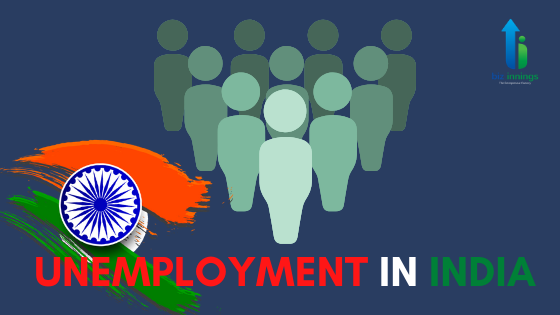Is Unemployment in India real?
Government as usual claims unemployment in India is being successfully eradicated as the Modi 2.0 aims at creating employment providers rather than employment seekers through various new programs like Make In India, Start-Up India, Skill India program and Mudra Yojana. Data, however, is mismatching and shocking, the Periodic Labour Force Survey (PLFS) casts a serious dent on the government’s entrepreneurship narrative, as the numbers reveal that most of the entrepreneurs in India don’t even earn enough to be able to become job creators.
As per the latest CMIE (Centre for Monitoring Indian Economy) report, the unemployment rate in 2019 is 7.2%, it rose 1.3% compared with 2018’s 5.9%, this margin is ringing danger bells. We have to take a deep dive into the root causes of unemployment in India to understand it from various aspects.
1. Indian Education System
The Indian education system is undoubtedly ages old and overburdened, it lacks a curriculum that encourages entrepreneurship and self-employment from a very young age. Students are taught to be doctors and engineers but not entrepreneurs. The Indian teaching methodology is not meeting the industry requirements.
The Indian education system is predominantly designed and structured only to clear examinations at various levels, no way it helps to improve interpersonal skills, organization skills and life skills. While US, Uk and most of the European counties education system aims at 360 degrees approach by providing access to a vast number of Science clubs, Sports clubs, Culture clubs and Public forums, India is yet to catch up with it.
2. Orthodox Investment Pattern
Savings in India are either invested in the land or in gold, none of this investments creates new employment, it’s not the case in other countries, In counties like US and China although people take up jobs initially, it’s just to gain relevant experience, they invest their savings in fulfilling their entrepreneurship dream which in return creates a lot of new employment opportunities every year. In an average month in the United States, 320 out of every 100,000 adults become new entrepreneurs and it’s multiplying. Literally no one encourages entrepreneurship in India. Launching a business in India requires much courage, dedication, tenacity and discipline.
3. Caste Discrimination
Indian society is by and large, in the group of traditions, conservatism and blind faith. Traditionally, certain jobs are not considered good, even today. Due to caste system, people hesitate to take up their traditional occupations, none of the elders in the family wants their next generation to continue their traditional community business, a Dhobi can easily involve his next generation into their caste business and scale up further by launching advanced laundry services across territories, vice versa a potter, weaver, barber and a shoemaker, in fact, it’s much easy for them to pass the know-how to the next generation which can locally create many jobs and decrease the burden on cities but they are fed up with caste discrimination from ages and want at least their next generation to take up jobs in the up society to escape the caste discrimination.
4. Indians prefer taking up a job over Entrepreneurship
Check within your circle, you hardly find any entrepreneurs, almost everyone chose to be doctors, Engineers and would be working for someone else. Although entrepreneurship is highly rewarding people stay away from it as it is a lonely journey until they succeed. When a business fails it will be financially and emotionally devastating, an average small business owner works 52 hours a week and a startup guy works 12 to 13 hours a day and 6 to 7 days a week. They undergo high-level stress, experience low quality of life and less recognition until they succeed, the fear of failure creates a high level of stress and anxiety, also few businesses which bubble every now and then are lacking innovation hence visible nowhere, post COVID-19 pandemic millions of jobs will be at risk, this is high time for all young and talented Indians to come forward and start on their own which not only creates self-employment but also opens doors for new jobs.
5. There are jobs but 90% of applicants are not fit for the job.
I strongly believe unemployment in India is not real somehow, I closely work with entrepreneurs and enterprise heads, I’m surprised to often hear from them that there are plenty of openings at various levels but finding a right fit even for an entry-level job is also tough nowadays, 95% CV’s don’t even pass the first level, hardly 5% reach the recruiters.
Students and job seekers should break the stereotype and parallelly focus on improving job skills, Interpersonal skills alongside the academics to bridge the gap. Religious, social norms and sexual harassment at work is also one more reason, which is stopping talented young women to take up jobs, strict laws have to be imposed yet in India to eradicate this imparity.
6. Highly Corrupted Bureaucrats and Politicians
Indians are undoubtedly one of the best talents on the globe but they prefer working abroad and starting at Silicon valley, top Indian talents prefer moving abroad not because they don’t love their land, they are actually fed up with the ages-old unchanged politicians and government employees who still follow old and reckless working style, they really don’t pay attention to viability, It’s tough for entrepreneurs to survive in India without paying the bribe, every one of us are victims of Red Tapism at one or the other level.
The huge number of permits and enormous time required for the processing of documents to initiate a business almost makes impossible to get the work done without bribing, this adversely affects the private sector of the Indian economy. India has been ranked at the 80th position among 180 countries and territories in the Corruption Perception Index (CPI) prepared by Transparency International.
Indian politicians and bureaucrats are highly corrupted, uncaring and self – centred, they often harass and intervened in entrepreneur’s lives which is why the super talents of the country are flying away and starting elsewhere. I have no hope that this will change even in the near future until the voters stop electing these irresponsible corrupted politicians.
7. Government lacks in setting up a favourable environment for Entrepreneurs.
Just a decade ago both India and China were considered to be high potential developing nations to become the world’s number one economy. Experts were in favour of India over China but it happened to be otherwise in no time. As per WTO data 2019, China holds 17.4% global export share whereas India is reduced to just 1.7%.
China hasn’t achieved this overnight, they broke their communist way of operating and adapted capitalism during this period, eradicated corruption to the most extent, opened doors for FDI, built huge harbours and export hubs, Invested in SEZ’s and encouraged youth towards entrepreneurship by providing an adequate amount of loans and training which helped them to skyrocket their exports and GDP.
The GDP per capita of China today is 8450.00 USD but India is still stuck at USD 2900. While other countries like Philippines, Mexico and Bangladesh are outperforming in all the segments, India remained a paper tiger. Although India introduced many reforms in the past it only helped politicians and the benefits hardly reached the deserved.
Corporate taxes in India are to the par with America but the value addition is almost nil. Look at the number of native products and apps Indians use, this shows how badly we are dependent on imports. Nurturing entrepreneurs, SME’s and creating entrepreneur favourable environment will only result in creating self-employment it also creates millions of new job opportunities.
The Agriculture and private sector in the country suffers from the absence of appropriate handholding, regulatory structure and unorganized framework. Enhancing the ease of doing business and implementing flexible labour laws in job-creating sectors, such as manufacturing and agriculture, can create the maximum number of jobs in rural India and thereby, in the States. Literacy, education, loans, skill training and physical infrastructure are the other policy levers that district and State administrations must focus upon to foster entrepreneurship and thereby, job creation and wealth creation.
Jai Hind.








